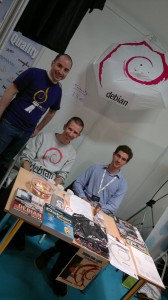 This is my monthly summary of my Debian related activities. If you’re among the people who made a donation to support my work (72.65 €, thanks everybody!), then you can learn how I spent your money. Otherwise it’s just an interesting status update on my various projects.
This is my monthly summary of my Debian related activities. If you’re among the people who made a donation to support my work (72.65 €, thanks everybody!), then you can learn how I spent your money. Otherwise it’s just an interesting status update on my various projects.
This month has been a short one since I have been away for 2 weeks of vacation.
Dpkg
My dpkg work encompasses a bunch of small tasks:
- I uploaded dpkg 1.16.7 with an important bugfix for a regression.
- I initiated a new round of discussions about how we were going to solve the problem that source packages with “Multi-Arch: same” binary packages can’t be individually bin-nmued.
- Following that discussion, I opened a bunch of bugs to plan/discuss the transition of changelog/copyright files within the package metadata (#681289 on debian-policy, #681293 on apt-listchanges, #681295 on www.debian.org for packages.debian.org).
- I also filed #681292 on sbuild to get it to use dpkg’s new syntax for bin-nmus. It will allow us to do binary-only rebuilds with arbitrary versions (instead of only “+b1” suffixes). Ubuntu could use this for their +rebuild1, we could use this to build backports which do not require source changes (and share the common source package instead of duplicating it). It can also be useful if we ever get to the situation where transitions are prepared in external repositories and where we want bin-nmus in those repositories to have unique versions (even though the same package might be bin-nmued in multiple repositories in case of concurrent transitions).
- I filed an unblock request for dpkg once it was almost 10 days old.
- I did reconsider the bug #316521 where dpkg looses track of some shared directories with manually created files and proposed an updated patch. No words from Guillem on the patch yet. Fixing this would help to fix a bunch of piuparts issues.
- And just before my vacation, I filed many bugs against dpkg itself, effectively moving some of the items that accumulated in my TODO in a public place where others can help (I’ll be happy to mentor anyone who wants to tackle one of these):
- #681443: dpkg-source –commit should be able to merge changes in an existing patch
- #681470: dpkg-shlibdeps: should also scan Build-Depends-Arch for minimal versions
- #681474: Dpkg::Vendor: should support /etc/os-release and /etc/os-release.d/*
- #681477: dpkg-vendor: implement –select-closest command
- #681480: base-files: Provide HOME_URL, SUPPORT_URL and BUG_REPORT_URL in /etc/os-release
- #681489: base-files: Add /etc/os-release.d/debian and make it easy to provide supplementary /etc/os-release.d/* files
- In #595112 we discussed the specifics of a new dpkg-mainstscript-helper feature to move a conffile from one package to another.
Packaging
I updated nautilus-dropbox to version 1.4.0 and python-django-registration to version 0.8. Both have been uploaded to unstable and I initially wanted to request an unblock for the latter, but it turns out it has gained reverse dependencies and version 0.8 introduces API changes so it’s not an option at this point of the freeze.
QA work
I investigated and fixed #678356 where it had been reported that the PTS static news were no longer working as expected.
At the start of the month, I also unblocked the mostly-unknown but important “mole” service… it was out of date of several weeks and several people were annoyed that the information about new upstream versions was no longer up-to-date.
Vacation
Almost no Debian work during my vacation but the lack of Wifi nearby made me look for solutions to connect my computer through my Nokia N900 3G/GPRS connection. I discovered the “Mobile Hotspot” application (homepage) and it worked like a charm (although it required Maemo’s non-default devel repository to be able to install the alternative kernel “for power users”).
The Debian Handbook
Michal Čihař proposed us to host a Weblate instance to help translate the book with a web interface. He kindly agreed to implement some improvements to better suit my requirements. Those have been completed and the weblate instance is now live at debian.weblate.org.
There’s no requirement to use Weblate for translations teams but for those that do, it sure makes it easier to recruit volunteers who have no prior knowledge of Git and PO files. If you want to help, please checkout this page first though, you should not start using Weblate without getting in touch with the respective translations teams.
Apart from translations, I also had the pleasure to merge some patches from Philipp Kern who improved the section covering IPv6 and a few other parts. We can make the book even better if more people share their expertise in the part of the book where they know better than me and Roland. 🙂
Thanks
See you next month for a new summary of my activities.

 I have recently read
I have recently read 
